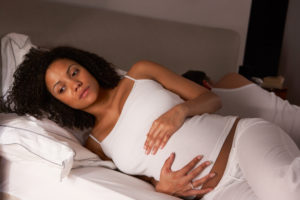When you buy through our links, we may earn a commission. Products or services may be offered by an affiliated entity. Learn more.
Sleep Deprivation and Postpartum Depression
Sleep deprivation is often an unavoidable part of being a new parent. For those who have just given birth, the sudden shifts in hormone levels, accumulated fatigue from pregnancy, and round-the-clock demands of caring for a new baby can take their toll. As a result, it is common for people in the postpartum period to experience a dip in energy and mood during the first two weeks after giving birth, commonly referred to as the baby blues.
Knowing how to identify postpartum depression is important, as it is a serious condition that requires proper treatment. A better understanding of the relationship between sleep deprivation and postpartum depression can help you recognize when to seek help from a doctor.
What Is Postpartum Depression?
People with postpartum depression may feel overwhelmingly anxious, hopeless, and unable to get out of bed. These feelings generally last for longer than two weeks and can be severe. They can also interfere with the ability to carry out day-to-day life and take proper care of an infant.
Approximately 1 in 8 women experience symptoms of postpartum depression after giving birth. People with postpartum depression often have trouble bonding with their babies. As a consequence, untreated postpartum depression can also have significant effects on the child’s development.
Postpartum depression is more common in certain groups, such as first-time mothers, mothers of preterm babies, people with a prior history of depression, and those who lack a strong support network. An increasingly recognized contributing factor for postpartum depression and anxiety is a lack of sleep .
It is important to promptly discuss any symptoms of depression or anxiety with a doctor, therapist, or psychiatrist in order to develop a treatment plan.
Looking to improve your sleep? Try upgrading your mattress.
Can a Lack of Sleep Cause Postpartum Depression?
While there are many contributing factors, it does appear that sleep deprivation can exacerbate symptoms of postpartum depression. Sleep deprivation is also linked to suicidal ideation in women with postpartum depression.
The relationship between sleep deprivation and postpartum depression is likely bidirectional , with depression often causing sleep problems as well. Furthermore, both of these conditions often have roots in similar issues, such as stress, anxiety, and changing hormone levels.
People who give birth experience changes in levels of estrogen, progesterone, and thyroid hormones . These changes affect the sleep cycle and can raise the likelihood of developing postpartum depression for those who are already at risk, especially if sleep does not improve .
Parents of infants who are difficult to soothe and who wake frequently during the night experience more symptoms of depression, anxiety, and fatigue.
Sleep problems may begin as early as pregnancy, with many parents never returning to the restful sleep they experienced before. Women who report very poor or drastically decreasing sleep quality during pregnancy are more likely to develop postpartum depression . Prioritizing better sleep during pregnancy may therefore be especially important for those who already have another risk factor for postpartum depression.
Postpartum Depression vs. Sleep Deprivation
Sleep deprivation and postpartum depression are both characterized by irritability, difficulty concentrating, tiredness, and trouble sleeping at night, all of which should be discussed with a doctor. It is important to seek immediate help if you are experiencing any of these more severe symptoms of postpartum depression:
- Sadness and mood swings accompanied by frequent bouts of crying
- Anxiety, fear, or panic attacks
- Thoughts of suicide
- Inability to sleep even when your baby is sleeping
- Loss of appetite
- Loss of interest in things you normally enjoy
- Feeling so overwhelmed that you have difficulty functioning
- Feelings of guilt and feeling like a bad parent
- Excessive preoccupation with the baby, or, conversely, an inability to bond
Postpartum depression can begin right after the baby is born, but it often develops more slowly over the following months. Doctors may not recognize the symptoms of postpartum depression because many of them — such as changes to sleeping patterns, appetite, and libido — are so similar to the natural changes that occur after delivery.
If your mood does not improve after a good night of sleep, or if it gradually worsens even as your baby starts sleeping better, share your concerns with your doctor so they can evaluate you for postpartum depression.
The American College of Obstetricians and Gynecologists asks doctors to implement regular screening for postpartum depression following birth. Being tired is a normal part of having a new baby, but you should still tell your doctor how you are feeling.
“Sleep is a critical part of any treatment plan for all postpartum conditions. Medications, therapy, and a support network are important, but women need sleep to fully recover.”
Dr. Carly Snyder, Reproductive and Perinatal Psychiatrist
How to Sleep Better if You Have Postpartum Depression
Though life with a newborn requires some major adjustments, you can set yourself up for better sleep by following healthy sleep hygiene practices wherever possible. These include habits like getting sunlight early in the day, eating well, and getting regular exercise. You may find it helpful to go for a walk with your baby every morning.
An ideal night of sleep includes completing balanced sleep cycles through various sleep stages. Sleeping for only short periods at a time — makes it virtually impossible to complete these restorative sleep cycles and benefit from the most important stages, slow-wave and rapid eye movement (REM) sleep. Establishing a regular sleep schedule is difficult when you are navigating your baby’s shifting sleep patterns. To increase nighttime sleep, consider alternating nighttime childcare duties with your partner or a family member so you can get a night of uninterrupted sleep.
When to See a Doctor
You should communicate to your doctor any negative feelings or problems sleeping, even if you believe they are just a normal part of being a new parent. This is especially true if feelings of worry, sadness, or anxiety last longer than two weeks or if you have thoughts of suicide. Your doctor can help you establish a treatment plan, which may involve a combination of therapy and medication.
As some new parents may be reluctant to share their feelings with a healthcare professional, it is a good idea for family and friends to check in regularly. Treating postpartum depression as early as possible is important in order to prevent it from becoming a long-term health problem. New parents can also contact the National Maternal Mental Health Hotline or the Postpartum Support International Hotline for additional resources and support.

Still have questions? Ask our community!
Join our Sleep Care Community — a trusted hub of sleep health professionals, product specialists, and people just like you. Whether you need expert sleep advice for your insomnia or you’re searching for the perfect mattress, we’ve got you covered. Get personalized guidance from the experts who know sleep best.
References
9 Sources
-
Division of Reproductive Health, National Center for Chronic Disease Prevention and Health Promotion. (2024, May 15). Symptoms of Depression Among Women. Centers for Disease Control and Prevention., Retrieved May 19, 2023, from
https://www.cdc.gov/reproductive-health/depression/ -
McEvoy, K. M., Rayapati, D., Washington Cole, K. O., Erdly, C., Payne, J. L., & Osborne, L. M. (2019). Poor postpartum sleep quality predicts subsequent postpartum depressive symptoms in a high-risk sample. Journal of Clinical Sleep Medicine, 15(9), 1303–1310.
https://pubmed.ncbi.nlm.nih.gov/31538601/ -
Sit, D., Luther, J., Buysse, D., Dills, J. L., Eng, H., Okun, M., Wisniewski, S., & Wisner, K. L. (2015). Suicidal ideation in depressed postpartum women: Associations with childhood trauma, sleep disturbance and anxiety. Journal of psychiatric research, 66-67, 95–104.
https://pubmed.ncbi.nlm.nih.gov/26001587/ -
Okun M. L. (2015). Sleep and postpartum depression. Current opinion in psychiatry, 28(6), 490–496.
http://journals.lww.com/00001504-201511000-00017 -
Trifu, S., Vladuti, A., & Popescu, A. (2019). The neuroendocrinological aspects of pregnancy and postpartum depression. Acta Endocrinologica, 15(3), 410–415.
https://pubmed.ncbi.nlm.nih.gov/32010366/ -
Lewis, B. A., Gjerdingen, D., Schuver, K., Avery, M., & Marcus, B. H. (2018). The effect of sleep pattern changes on postpartum depressive symptoms. BMC women’s health, 18(1), 12.
https://pubmed.ncbi.nlm.nih.gov/29316912/ -
Sweet, L., Arjyal, S., Kuller, J. A., & Dotters-Katz, S. (2020). A Review of Sleep Architecture and Sleep Changes During Pregnancy. Obstetrical & gynecological survey, 75(4), 253–262.
https://journals.lww.com/10.1097/OGX.0000000000000770 -
Tomfohr, L. M., Buliga, E., Letourneau, N. L., Campbell, T. S., & Giesbrecht, G. F. (2015). Trajectories of Sleep Quality and Associations with Mood during the Perinatal Period. Sleep, 38(8), 1237–1245.
https://pubmed.ncbi.nlm.nih.gov/25845691/ -
ACOG Committee Opinion No. 757: Screening for Perinatal Depression. (2018). Obstetrics and gynecology, 132(5), e208–e212.
https://journals.lww.com/00006250-201811000-00042













